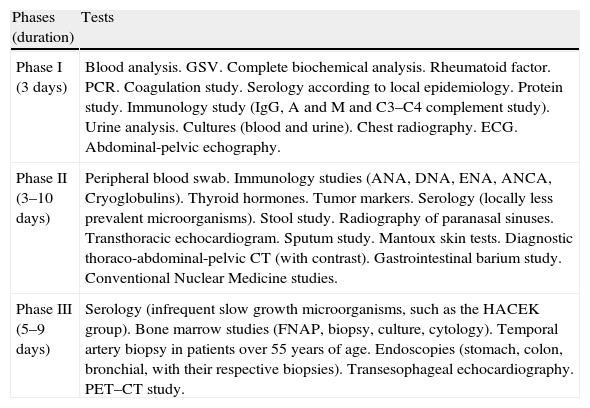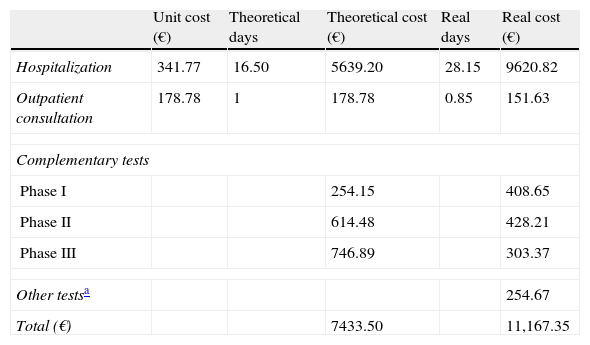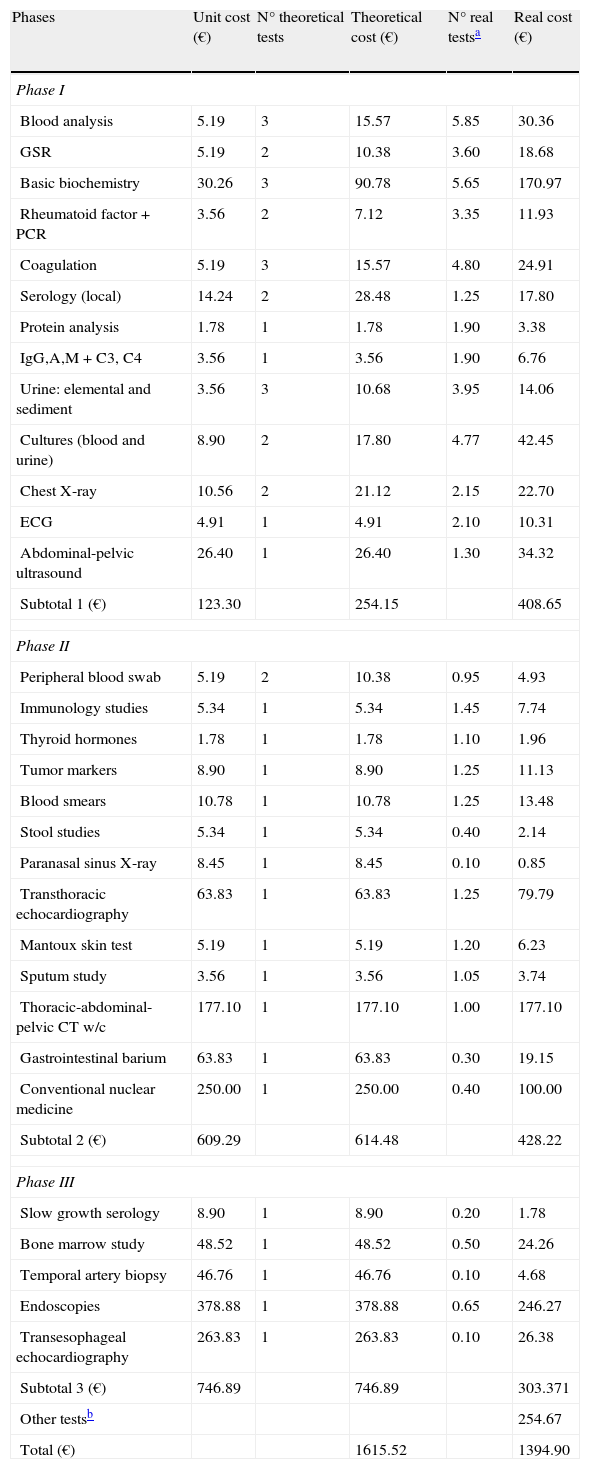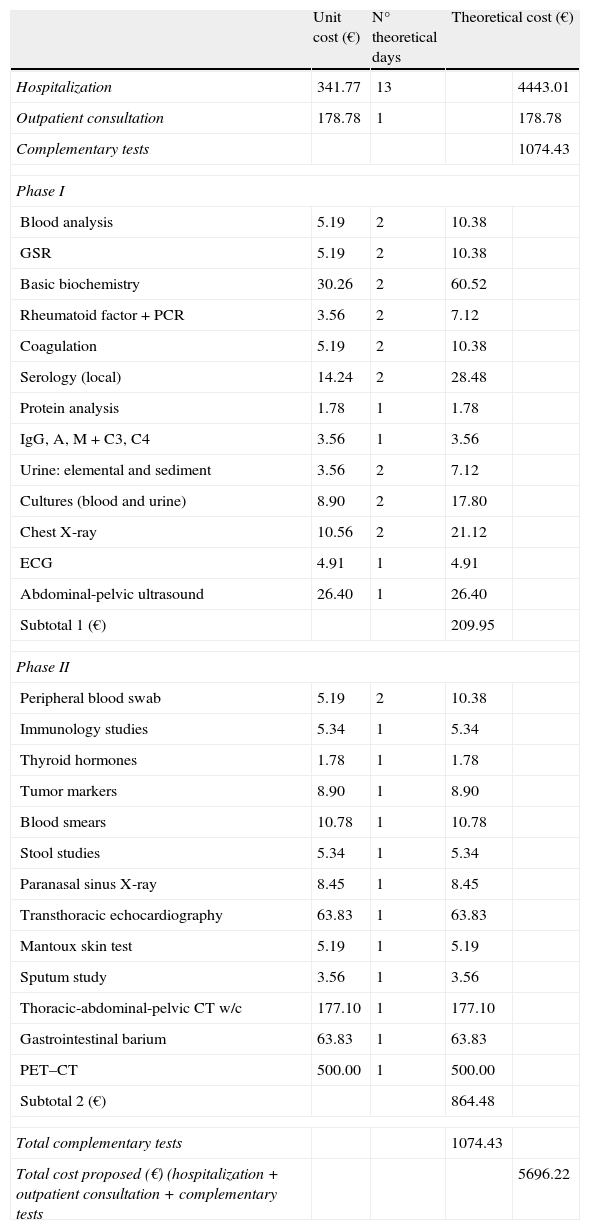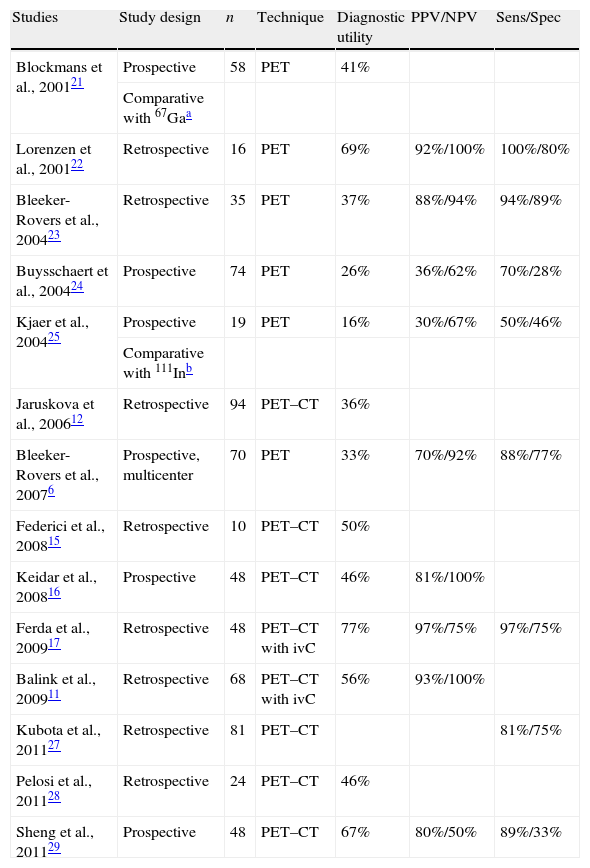To analyze the costs of fever of unknown origin (FUO) prior to the PET–CT study. To determine the effectiveness of PET–CT in the diagnosis of FUO. A proposal of diagnostic algorithm.
Material and methodsA retrospective study was performed that included 20 patients who had been studied between January 2007 and January 2011, with a mean age of 57.75 years and FUO diagnosis. All underwent a PET–CT study with 18F-FDG.
Individual and mean costs of FUO in these patients were assessed, including hospitalization days and complementary tests prior to the PET–CT study.
The effectiveness of the PET–CT study in the diagnosis of FUO was analyzed. Costs of the FUO process were determined, including those of the PET–CT study, and if it had been done earlier in the diagnostic process.
ResultsMean hospital stay per patient until the PET–CT study was 28 days. The cost per hospitalization day was 342 €. Average cost per patient in complementary tests was 1395 €. Total cost of the FUO process until the PET–CT study was around 11167 € per patient.
The PET–CT study showed a 78% sensitivity, 83% specificity, 92% PPV and 62% NPV.
If PET–CT had been performed earlier in the FUO process, assuming the same effectiveness, 5471 € per patient would have been saved.
ConclusionThe PET–CT study could be cost-effective in the FUO process if used at an early stage, helping to establish an early diagnosis, reducing hospitalization days due to diagnostic purposes and the repetition of unnecessary tests.
Analizar los costes previos a la PET-TC del proceso fiebre de origen desconocido (FOD). Determinar la efectividad de la PET-TC en el diagnóstico de FOD. Propuesta de algoritmo diagnóstico.
Material y métodosSe realizó un estudio retrospectivo, que incluyó a 20 pacientes estudiados entre enero de 2007 y enero de 2011, con diagnóstico de FOD y con una edad media de 57,75 años. A todos los pacientes se les realizó un estudio PET-TC con 18F-FDG.
Se analizaron los costes individuales y las medias que representó el proceso FOD de estos pacientes, incluyendo días de hospitalización y pruebas complementarias previas a la PET-TC.
Se valoró la efectividad de la PET-TC en el diagnóstico de FOD. Se determinaron los costes del proceso FOD, incluyendo el de la PET-TC y si ésta se hubiera realizado de forma precoz.
ResultadosLa estancia media hospitalaria por paciente hasta la PET-TC fue de 28 días. El coste por día de hospitalización fue de 342 €. El coste promedio por paciente en pruebas complementarias fue de 1.395 €. El coste total del proceso FOD hasta la PET-TC fue de 11.167 € por paciente.
La PET-TC mostró una sensibilidad del 78%, una especificidad del 83%, un VPP del 92% y un VPN del 62%.
Si la PET-TC se hubiera realizado antes en el proceso FOD, asumiendo la misma efectividad, se hubieran ahorrado 5.471 € en cada paciente.
ConclusionesLa PET-TC pudiera ser costo-efectiva en el proceso FOD si se empleara de forma precoz, porque ayudaría a establecer un diagnóstico temprano, reduciendo los días de hospitalización por motivos de estudio y la repetición de pruebas innecesarias.
Article
If you experience access problems, you can contact the SEMNIM Technical Secretariat by email at secretaria.tecnica@semnim.es or by phone at +34 619 594 780.

Revista Española de Medicina Nuclear e Imagen Molecular (English Edition)







